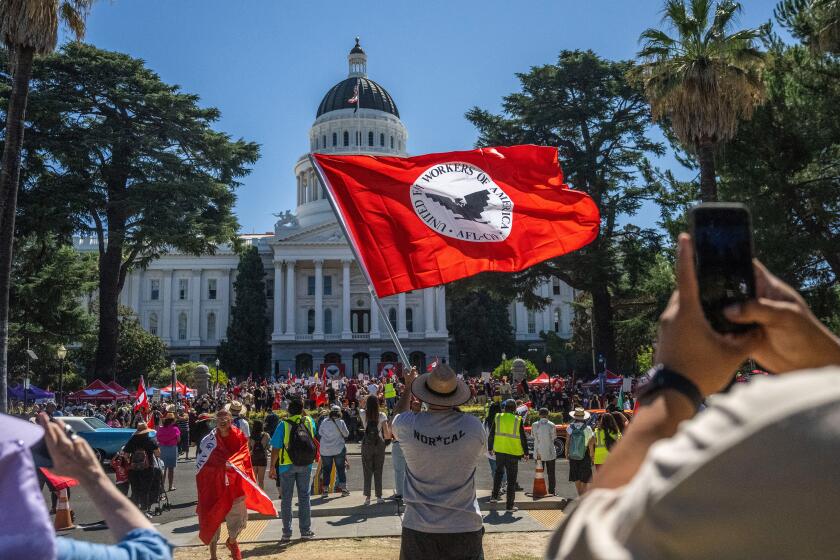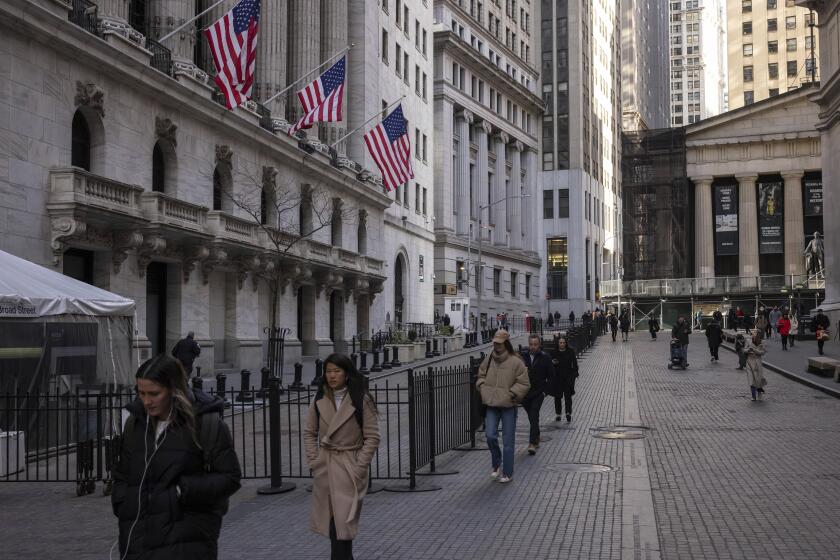TOP STORIES -- Dec. 9-13
Employers Plan to Spend More on Health Care
Los Angeles-area companies expect health-care spending on their employees to jump nearly 15% next year, according to a survey by Mercer Human Resource Consulting. That would come on top of an expected 8.6% bump this year, when employers are spending an average of $5,628 per worker.
Sixty-eight California companies were part of the survey, which polled 2,889 employers across the country.
Nationally, employers expect health-care costs to rise 14.6% in 2003, about the same as this year’s 14.7% increase, the steepest in a dozen years and seven times the rate of inflation.
Employers in the Los Angeles area are expecting the rate of increase to double next year because they have been more aggressive in curtailing costs through higher co-payments and deductibles and more restricted formularies, said Praveen Thadhani, a Mercer human resources consultant. Many local employers don’t think they can take as hard a line with workers this coming year, he said.
*
UAL Seeks Chapter 11 Bankruptcy Protection
The parent of United Airlines filed for bankruptcy reorganization, setting in motion a major overhaul of the loss-ridden carrier. The Chapter 11 filing means United will continue operating while it develops a plan to pay back its creditors.
For now, the No. 2 airline behind AMR Corp.’s American Airlines has vowed to continue flying its current schedule and maintain its frequent-flier program.
But in coming months, the carrier and parent UAL Corp. are expected to undergo significant changes that could include shrinking the airline and selling off routes and other assets to raise cash. Those changes, in turn, are likely to trigger major shifts throughout the airline industry and in the choices available to travelers.
United is the biggest airline at the Los Angeles and San Francisco airports, and several of its most heavily traveled routes involve the two cities.
United, the most powerful and profitable airline only a few years ago, is awash in red ink and unable to make payments on its $21 billion of debt. Its Chapter 11 filing culminated a grueling downturn at the company in the last two years that produced record losses, eroded service, alienated many passengers and sapped employees’ morale.
*
Bush Nominates 3 to Economics Team
President Bush announced three appointments to his economics team, which had been shaken up by resignations and dismissals.
Bush said he would nominate the chairman and chief executive of CSX Corp., John W. Snow, as Treasury secretary, putting a corporate leader in charge of the struggling economy. Snow, a veteran of the Ford administration, brings a resume that crosses an academic’s economics knowledge with the reality of a quarter of a century in the business world at CSX, a transportation holding company.
Bush also named Stephen Friedman, a former co-chairman of investment firm Goldman, Sachs & Co., to succeed Lawrence B. Lindsey as chairman of the National Economic Council, a White House advisory group.
Lindsey and Treasury Secretary Paul H. O’Neill were dismissed Dec. 6, submitting their resignations as the White House hurried to spur economic growth before entering the early phases of Bush’s 2004 reelection campaign.
Bush also nominated William H. Donaldson, a former investment banker, academic and Wall Street official, to head the Securities and Exchange Commission, a move aimed at restoring confidence in the financial integrity of corporate America. Donaldson would replace Harvey L. Pitt, who resigned last month after a series of controversies that raised questions about his ability to be a tough overseer of Wall Street amid this year’s torrent of business scandals.
*
EchoStar Throws in the Towel on DirecTV Deal
EchoStar Communications Corp. finally abandoned its proposed $18-billion acquisition of Hughes Electronics Corp., the owner of satellite TV giant DirecTV. But EchoStar will end up paying its El Segundo-based rival only a fraction of a previously negotiated penalty for backing out of the deal.
Under a settlement with Hughes’ parent, General Motors Corp., EchoStar has paid the full $600-million breakup penalty but it will avoid having to spend $2.7 billion, as called for under the original merger agreement, to purchase Hughes’ controlling stake in PanAmSat, a commercial satellite service.
The settlement may clear the path for a sale of Hughes to News Corp., the entertainment giant controlled by Rupert Murdoch that lost a bidding war to EchoStar a year ago. Murdoch called Hughes to request a meeting with GM. Murdoch has said he would be interested in purchasing GM’s 30% controlling stake in Hughes.
*
K2 Pursues Baseball Glove Maker Rawlings
K2 Inc. confirmed that it is making a pitch for Rawlings Sporting Goods Co., one of the nation’s oldest suppliers of baseball gloves and equipment, in a move designed to make the Los Angeles-based snowboard and ski manufacturer a company for all seasons. K2, which sells Olin skis and Ride and Morrow snowboards as well as Shakespeare fishing gear, said it has been in talks to take over 115-year-old Rawlings, of Fenton, Mo., since last month. Details of the discussions weren’t disclosed.
*
Seagate Stock Offering a Disappointment
Computer disk-drive maker Seagate Technology Holdings went public and the tepid response from investors spoke reams about the state of the IPO market. After the company priced its new shares at $12 each -- compared with expectations of $13 to $15 -- Seagate slumped to close at $11.50 in its debut trading session on the New York Stock Exchange, a result that rendered it “broken” in market-speak.
Seagate, which is incorporated in the Cayman Islands but is run from Scotts Valley, Calif., is one of only 16 California companies to be taken public this year. Indeed, 2002 is shaping up to be the slowest year for IPOs by California companies since at least 1980, according to data tracker Thomson Financial.
The national picture isn’t much better: 82 companies nationwide have floated IPOs this year, also the slowest pace in at least a decade. The long bear market has made many investors unwilling to take a chance on shares of new companies.
*
Workers Accuse FedEx of Discrimination
Twenty-six current and former California employees of FedEx Corp. filed a lawsuit accusing the world’s largest express shipper of widespread discrimination against minorities and women.
The suit alleges that the Memphis, Tenn.-based company relegates most minorities to low-paying, casual and even dangerous jobs and undermines their efforts to advance. When employees complain, FedEx fails to take appropriate action and, in some cases, retaliates, the suit alleges. It also accuses FedEx of falsifying time cards and failing to pay overtime.
A FedEx spokeswoman said the claims appear to be without merit.
Of FedEx’s 117,000 U.S. employees, about 15,000 work in California.
*
California Dealt Blow on Power Costs
A federal regulatory judge found that energy companies overcharged California utilities by $1.8 billion during the electricity crisis -- far short of the $9 billion that Gov. Gray Davis and others had demanded. According to the finding, it’s the power suppliers that are owed money -- $1.2 billion for unpaid bills.
The initial finding by Judge Bruce Birchman of the Federal Energy Regulatory Commission sparked angry denunciations from California officials. “The Federal Energy Regulatory Commission rigged the rules,” Davis said at a news conference in Sacramento. “They threw out just about everything we could claim.”
Davis said he would continue to press the state’s case before FERC, in the political arena and in the courts. He said he would write to President Bush demanding that FERC “do the right thing.”
Despite the setback, Davis promised that utility rates to California consumers would fall within 24 months with the decline of financing charges for emergency power purchases by the state. And he emphasized that any refunds from generators would be used to further reduce consumers’ bills.
*
Worries Spark Gold Rush; Stocks Fall
The specter of war, terrorism and the use of nuclear weapons sent gold near three-year highs at the end of the week with jittery investors looking ready to chase the precious metal still higher as 2002 draws to a close.
Spot gold rose to $335.25, bringing the three-year-old high at $338 firmly into traders’ sights. It is up about 20% in 2002.
Meanwhile, U.S. stock indexes fell for a second week. The S&P; 500 and Dow lost 2.5% and Nasdaq 4.2%.
Crude oil rose to an eight-week high as a nationwide strike aimed at ousting Venezuelan President Hugo Chavez limits shipments to refineries from the world’s fifth-biggest oil exporter.
*
For a preview of this week’s business news, please see Monday’s business section.






